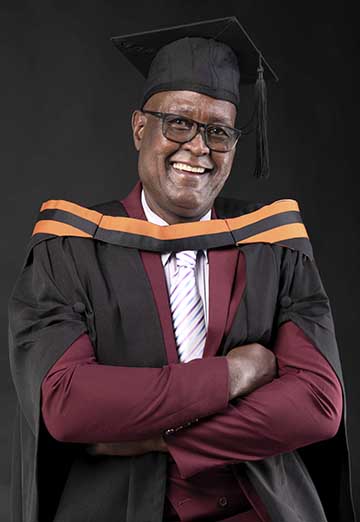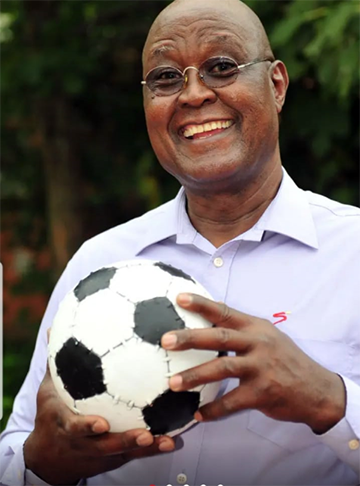News & Events
He shoots, he scores … a master’s!
Legendary South African sports broadcaster, Zama “ZZ” Masondo, affectionately known as “Mr Laduma”, is officially a Unisa alumnus in his 70s. Masondo recently graduated cum laude with a Master of Arts in African Languages. He says: “Knowledge is power, and you are never too old to acquire any form of education.”

Zama “ZZ” Masondo
Masondo was admitted through the Recognition of Prior Learning process. His master’s supervisor, Professor Stanley Madonsela, who is also the Acting Chair of the Department of African Languages in the College of Human Sciences, says that Masondo’s application went through a vetting process by the department’s Higher Degrees Committee, which recommended that he be admitted for the qualification. Madonsela explains: “He was admitted on the basis that he holds an undergraduate degree majoring in African languages. His vast experience in the language and development sector as a sports commentator and his contribution in coining a great deal of soccer terms and phrases in isiZulu were considered valuable traits.”
Masondo began his career at the South African Broadcasting Corporation in the early 1980s as a translator/writer. His love for education and the drive to empower himself made it possible for him to keep improving his qualifications. “It is clear that everyone should have something to fall back on in life,” he says. Over and above his job as a sports commentator, Masondo resumed his activities as a skills service provider in tourism and hospitality. “My wife played a vital role as she had the same qualifications that I possessed,” he says.
Briefly reflecting on the past, Masondo remarks: “Sports in South Africa was considered to be a racial thing, and as a result sports commentating in African languages was not so popular.” He adds: “Due to economic sanctions that were imposed by most countries against South Africa because of its apartheid policies, sports teams and African commentators were excluded from international events. This took away the opportunities for African languages to develop in the sporting fraternity.”
Masondo recalls that racially polarised communities and teams meant that fans could not interact with each other and were often intolerant of one another at stadiums. “Lack of access to stadiums for black commentators was also a thorny issue as some areas were designated for whites.” He explains that since the endorsement of South Africa’s eleven official languages post the democratic elections in 1994, it has been easy to embrace African languages in sport commentating.
Transformation in sports broadcasting
Masondo states: “Language development is misconstrued to be associated with the academic field and other related environments, but this mind-set can be misleading as there is much that sports commentating can do to contribute towards language development.” His master’s study explored the relationship between language and the catch phrases predominantly used in soccer.
He explains: “Transformation in the broadcasting field has taken a new twist in SA, especially with the dawn of democracy. The discourse is made more relevant by the ever-changing nature of African languages in general and isiZulu catch phrases used in sport presenting in particular.” He adds: “Soccer has managed to unite the country and revive the flame of happiness, particularly in the black communities. The 2010 FIFA World Cup also united many South Africans from different racial groups, an interaction which was previously prohibited by apartheid laws.”
A highlight never to be forgotten
Laduma!, meaning “It’s a goal!”, is one of the most popular catch phrases that Masondo coined and it has become popular also in Brazil. He says: “The purpose of this invention was to bring uniqueness, excitement and fun to my soccer commentary style. Its roots can be traced back to the 1990s when I was travelling a lot, sending local clients on pre-packaged overseas tours and covering the matches of our national team, Bafana Bafana.”

Masondo recalls: “In 1992 during my tour in Rio De Janeiro, Brazil, among the places I visited was Maracana Stadium to watch an encounter between Sweden and Brazil. I was privileged to be offered a position in the commentary booth.” He says that he listened to a Brazilian commentator shouting with tremendous energy the longest ‘Goooo-aaaaal!. “This compelled me to adopt the style and introduce the longest Laduuuuuuuumah! with similar energy, and I embellished it with my deep baritone.” With a smile, Masondo says: “The whole country was abuzz, with everybody trying to adopt it as a generic word so that they can avoid paying royalties to me.”
Tremendous study support at Unisa
Masondo singles out specific Unisa academics for encouraging and guiding him relentlessly, as well as for the study support that they and the university at large offered him throughout his journey. “Among others,” he says, “I would like to thank my supervisor, Professor Madonsela whose guidance and unfailing enthusiasm has been a tremendous source of encouragement. His door was always open for discussions and advice, and he never gave up on me.”
Madonsela says: “It has been a fulfilling journey for me to supervise Mr Masondo. We had a good relationship, which served as the basis for good performance, a way to promote collaboration and the success of his studies. At the core of our relationship were mutual respect, cooperation and communication, encouragement, inspiration and the creation of ideas.”
Masondo says that the former Principal and Vice-Chancellor of the university, Professor Mandla Makhanya, also encouraged him with a phrase “Imfundo kayikhulelwa” meaning, “You are never too old to acquire education”. “Furthermore, I am grateful that the university awarded me a bursary, which provided financial means to complete the project,” he adds.
Masondo says that his academic experience was superb. “Unisa is an internationally acclaimed university with the best reputation among distance learning institutions,” he says. “I take every opportunity to recommend the institution to my fellow students, nationally and internationally.”
His message to the South African youth is to never give up on a good thing. “Education is good and empowering,” he concludes. “Take it from me, it is not easy but doable.”
*By Nancy Legodi, Acting Journalist, Department of Institutional Advancement
*Photos were supplied by the interviewee.
Publish date: 2021-06-04 00:00:00.0

